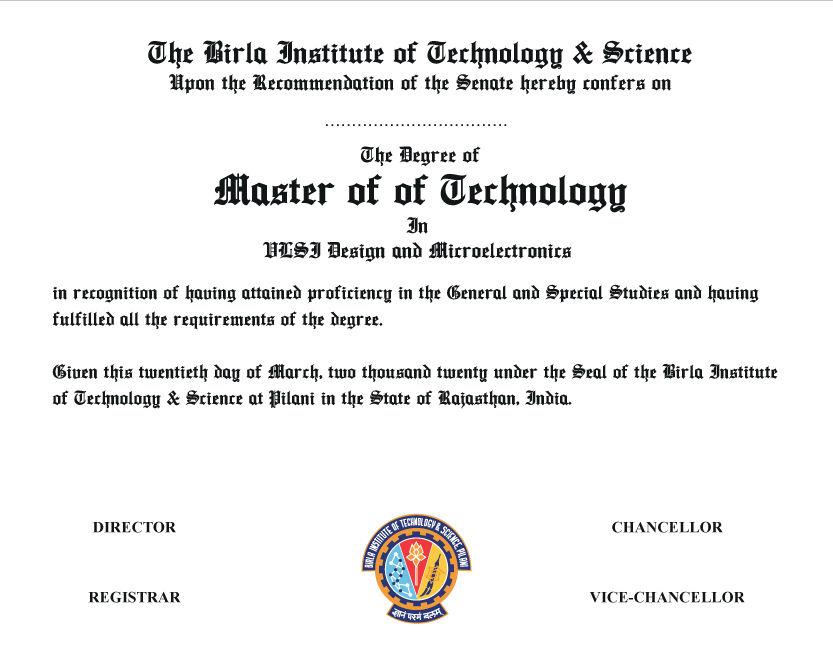M.Tech. VLSI Design and Microelectronics, a four-semester Work Integrated Learning Programme, is designed to cater to the needs of working professionals in the semiconductor industry. It is a specialized postgraduate program focused on the design, development, and application of integrated circuits and semiconductor devices. It covers key areas like digital and analog VLSI design, semiconductor physics, fabrication technologies, and the use of Electronic Design Automation (EDA) tools. The program emphasizes hands-on experience with industry-standard tools and labs, preparing students for real-world challenges in designing complex ICs. The program provides an interdisciplinary approach, combining hardware and software knowledge for solving complex problems in the industry.
English
Course Start Date:
April, 2026
Application Deadline:
Closing Soon
Duration:
2 Years
₹ 2,98,400
Overview
The M.Tech. VLSI Design and Microelectronics is a Work Integrated Learning Programme (WILP) spanning four semesters. BITS Pilani's Work Integrated Learning Programmes are approved by the University Grants Commission (UGC). Working professionals can attend contact classes from anywhere over a technology-enabled platform, mostly on weekends or after business hours. The programme offers courses covering back-end and front-end microelectronics, including Processor & SoC Design, Chip Design, VLSI CAD Tool Development, and Semiconductor Fabrication. Students have access to virtual labs providing cloud-based access to Cadence EDA tools, Vivado-ML, and Keil software, as well as remote labs providing access to STM-32 kits, Zedboards, and PYNQ boards from Xilinx. The dissertation project in the final semester enables students to apply concepts and techniques learned during the programme to a real-world complex project. The continuous evaluation system provides timely feedback to help busy professionals stay on course.
Why MTech (Master of Technology)?
M.Tech. VLSI Design and Microelectronics from BITS Pilani is a comprehensive four-semester Work Integrated Learning Programme specifically designed for working professionals in the semiconductor industry. This UGC-approved program prepares students to design and analyze analog, digital, and RF CMOS integrated circuits, providing both theoretical foundations and practical experience with industry-standard EDA tools. The curriculum spans key areas including MOS devices and microfabrication technology, analog IC design, CAD for VLSI design flow, and VLSI architecting, complemented by specialized electives in advanced digital systems, analog-mixed signal-RF, and other emerging technologies. Students benefit from virtual and remote labs offering access to professional tools like Cadence EDA, Vivado-ML, and Xilinx FPGA boards, enabling real-world application of concepts. Classes are conducted on weekends or after business hours via an online platform, allowing professionals to continue working while studying. The program culminates in a dissertation project and offers an easy EMI payment option with 0% interest, making it an ideal choice for ambitious engineers in the semiconductor industry seeking to advance their expertise and careers.
What does this course have to offer?
Key Highlights
UGC approved programme
Designed for professionals in the semiconductor industry
Online contact classes on weekends or after business hours
Covers both back-end and front-end microelectronics
Access to virtual and remote labs with industry-standard tools
Hands-on experience with Cadence EDA tools, Vivado-ML, and Xilinx boards
Dissertation project in final semester
Continuous evaluation system
EMI payment option with 0% interest
BITS Pilani Alumni status upon completion
Who is this programme for?
Semiconductor industry professionals
VLSI design engineers
IC fabrication specialists
Processor design engineers
Chip designers for analog/digital/mixed signal
System on Chip (SoC) architects
Micro-architects in electronics industry
EDA tool engineers
FPGA developers
Professionals seeking expertise in semiconductor technologies
Minimum Eligibility
Employed professionals holding B.Tech./ BE/ M.Sc./ MCA or equivalent in relevant disciplines with at least 60% aggregate marks and minimum one year of work experience after the completion of the degree in relevant domains.
Who is the programme for?
The M.Tech. VLSI Design and Microelectronics programme follows a structured admission process designed for working professionals in the semiconductor industry. Applicants must hold a Bachelor of Engineering in EEE / ECE / ENI / Computer Science or equivalent with at least 60% aggregate marks and minimum one year of work experience in relevant domains. The programme is particularly suitable for ambitious engineers in the Semiconductor industry seeking expertise in system on Chip design, Processor design, IC fabrication, and VLSI CAD, as well as Electronics industry professionals, Micro-Architects, EDA Tool Engineers, and Analog/Digital/Mixed Signal Chip Designers. The application process is entirely online through the BITS Pilani Application Centre. Applicants need to submit an Employer Consent Form authorized by their organization's HR or authorized signatory, along with a Mentor Consent Form signed by their chosen mentor. The academic structure consists of four semesters with a mix of core courses and electives, with the fourth semester dedicated to Dissertation/Project Work. The programme uses a Continuous Evaluation System that assesses learners over convenient and regular intervals, providing timely feedback to help busy working professionals stay on course.
Here's a Glimpse of Your Degree

*Disclaimer: The image is for illustrative purposes only and may be subject to change at the discretion of Management.
Selection process
How to apply?
Curriculum
The M.Tech. VLSI Design and Microelectronics curriculum is designed to provide comprehensive knowledge and skills required for career advancement in the semiconductor industry. The coursework spans four semesters, with the first three semesters covering required coursework and the fourth semester dedicated to Dissertation/Project Work. Students need to complete at least 12 courses plus a final dissertation. The curriculum includes a mix of core courses and electives. First semester courses include MOS Devices and Microfabrication Technology, Analog IC Design, and CAD for VLSI Design Flow. Second semester courses include VLSI Design and VLSI Architecting, the RTL Way. The third semester focuses on elective courses, allowing students to customize their learning experience based on their career interests. Electives are organized in three baskets: Basket 1 includes Advanced Digital Systems, Machine Learning for Electronics Engineers, Hardware Software Formal Verification Techniques, System on Chip Design, Testability for VLSI, Reconfigurable Computing, Digital Signal Processing, Advanced Digital Signal Processing, High Speed SerDes Design, Advanced VLSI Design, and Advanced VLSI Architectures. Basket 2 focuses on Advanced Analog-Mixed Signal-RF, RF Microelectronics, Digitally Assisted Analog Circuits, Phase and Frequency Synthesis of Analog Circuits, Advanced Analog and Mixed Signal Design, and Data Converters. Basket 3 includes other electives such as Introduction to MEMS, Optoelectronic Devices, Circuit & Systems, Wireless & Mobile Communication, Real Time Operating Systems, Hardware Security, Embedded System Design, Novel Memory Concepts and Technology, Real Time Systems, In-Memory Computing, CAD for IC Design, Hardware Software Co-Design, and Network Embedded Applications. The choice of electives is made available to enrolled students at the beginning of each semester, with a limited selection offered at the discretion of the Institute.
There are 4 semesters in this course
The M.Tech. VLSI Design and Microelectronics programme is designed around a powerful educational approach called Work Integrated Learning (WIL). This internationally recognized approach involves three parties - the student, educational institution, and employer organization - and consists of authentic work-focused experiences as an intentional component of the curriculum. The BITS Pilani Work Integrated Learning Programmes are designed in collaboration with industry partners and subject matter experts, enabling students to remain relevant in their chosen profession. The programme emphasizes experiential learning that allows learners to apply concepts learned in the classroom to simulated and real work situations. This is achieved through Virtual & Remote Labs, which provide access to hardware and software tools used for designing and testing embedded and VLSI systems. Virtual labs provide cloud-based access to professional tools like Cadence EDA tools, Vivado-ML, and Keil software. Remote labs offer remote access to hardware platforms including STM-32 kits, Zedboards, and PYNQ boards from Xilinx. The curriculum includes continuous assessment through graded assignments, quizzes, mid-semester exams, and comprehensive exams. Carefully chosen real-world cases and assignments are used as problem-solving exercises, and the final semester dissertation allows students to apply their knowledge to complex real-world scenarios. This approach enables working professionals to pursue the programme without any career break, with contact classes conducted mostly on weekends or after business hours.
First Semester
Second Semester
Third Semester
Fourth Semester
Programme Length
The M.Tech. VLSI Design and Microelectronics programme spans four semesters, typically taking two years to complete. The programme is designed with a flexible structure to accommodate working professionals, with contact classes conducted mostly on weekends or after business hours. This allows participants to pursue the degree without taking a career break. Each semester lasts approximately 16-20 weeks, with the first three semesters covering coursework and the fourth semester dedicated to dissertation or project work. The programme follows a continuous evaluation system that assesses learners over convenient and regular intervals, helping busy working professionals stay on track.
Whom you will learn from?
Learn from top industry experts who bring real-world experience and deep knowledge to every lesson. The instructors are dedicated to help you achieve your goals with practical insights and hands-on guidance.
Instructors
Veteran IT Professional and Educator in Embedded Systems and Enterprise Software
Prof. K. Gopala Krishna is an Associate Professor in the Work Integrated Learning Programmes (WILP) Division at BITS-Pilani. With over 35 years of experience in the IT industry, he has been teaching working professionals in Indian IT organizations since 2009. Prof. Krishna specializes in the design and delivery of products and services for global clients in Embedded Systems and Enterprise Software.
Signal Processing Expert and Educator
Prof. Satya Sudhakar Yedlapalli is an Associate Professor with the Work Integrated Learning Programmes (WILP) in the Department of Electrical and Electronics Engineering at BITS-Pilani. Based at the Bangalore Off-Campus Center since 2014, he serves as a Group Leader for EEE-WILP-OffCampus since 2021. Prof. Yedlapalli holds a B.E. from Andhra University, an M.Tech from IIT-Madras, and a Ph.D. from IISc-Bangalore.
Tuition Fee
Total program cost is INR 298,400 payable semester-wise with 0% interest EMI and zero down payment; all fees are non-refundable, and students must purchase their own textbooks.
Fee Structure
Payment options
Financing options
Financial Aid
Learning Experience
The M.Tech. VLSI Design and Microelectronics programme provides a comprehensive learning experience that blends theoretical knowledge with practical application. The education is delivered through a mix of contact classes and hands-on experiential learning. Contact classes are conducted over a technology-enabled platform that can be attended via the internet from any location. These classes offer similar levels of interactivity as regular classrooms at the BITS Pilani campus and are conducted usually over weekends or after business hours for a total of 7-8 hours per week. If students miss a lecture, they can access the recorded lecture on the internet. The experiential learning component includes lab exercises, assignments, case studies, and work-integrated activities. The programme makes extensive use of Virtual & Remote Labs. Virtual labs provide cloud-based access to professional tools like Cadence EDA tools, Vivado-ML, and Keil software. Remote labs offer access to hardware platforms including STM-32 kits, Zedboards, and PYNQ boards from Xilinx. These labs enable students to design and test embedded and VLSI systems, applying concepts learned in the classroom to practical scenarios. The programme offers high interactivity between students and faculty members. During contact classes, students can pose questions to faculty through voice and chat. Further interaction is enabled through the e-learning portal using discussion forums and message boards. The curriculum emphasizes real-world application through carefully chosen case studies and assignments, culminating in a dissertation project in the final semester.
University Experience
BITS Pilani offers a rich university experience for M.Tech. VLSI Design and Microelectronics students. As a BITS Pilani Work Integrated Learning Programme (WILP), it provides access to the institution's resources and academic excellence while allowing working professionals to continue their careers. The programme is UGC approved and maintains the same high standards as campus-based programmes. Students benefit from interactions with a distinguished faculty with extensive academic and industry experience in microelectronics, VLSI design, and related fields. The programme features Virtual & Remote Labs that provide practical learning experiences. Virtual labs offer cloud-based access to professional tools like Cadence EDA tools, Vivado-ML, and Keil software. Remote labs provide access to hardware platforms including STM-32 kits, Zedboards, and PYNQ boards from Xilinx. These labs enable students to design and test embedded and VLSI systems, applying concepts learned in the classroom to practical scenarios. The programme offers high interactivity between students and faculty members through both live sessions and the e-learning portal. The continuous evaluation system ensures regular feedback and support throughout the learning journey. The institution has 34 designated examination centers across India and one in Dubai, providing convenient access for students. Additionally, international students meeting specific requirements can avail online examinations. Upon successful completion, participants receive a degree certificate from BITS Pilani and become members of the elite global community of BITS Pilani Alumni, gaining access to a valuable network of professionals across industries.
Testimonials
Testimonials and success stories are a testament to the quality of this program and its impact on your career and learning journey. Be the first to help others make an informed decision by sharing your review of the course.
Loading alumni...
About the University
Established in 1964, BITS Pilani is a prestigious private university located in Pilani, Rajasthan, India. It is recognized for its high academic standards and innovative curriculum in engineering, sciences, management, and humanities. BITS Pilani is known for its unique educational model that emphasizes self-directed learning and practical experience.
15000
Total Students
10000
Undergraduate Students
5000
Graduate Students
Affiliation & Recognition
-1726819186623.svg)
National Board of Accreditation (NBA)
Faculties
These are the expert instructors who will be teaching you throughout the course. With a wealth of knowledge and real-world experience, they're here to guide, inspire, and support you every step of the way. Get to know the people who will help you reach your learning goals and make the most of your journey.
Instructors
Assistant Professor
Jagat Sesh Challa, Assistant Professor at BITS Pilani, specializes in Big Data Analytics and HPC. He holds a Ph.D. in Computer Science and leads the Postman API and Coding Innovation Lab.
Career services
The Career Services at BITS Pilani provide comprehensive support for students' career development. Services include career counseling, resume workshops, job fairs, and networking events with industry professionals. The center facilitates internships and co-op opportunities to enhance practical experience.
Numerous
Internship Opportunities
95%
Job Placement Rate
2000+
Career Counseling Sessions
Course Start Date:
April, 2026
Application Deadline:
Closing Soon
Duration:
2 Years
₹ 2,98,400
Frequently asked questions
Below are some of the most commonly asked questions about this course. We aim to provide clear and concise answers to help you better understand the course content, structure, and any other relevant information. If you have any additional questions or if your question is not listed here, please don't hesitate to reach out to our support team for further assistance.






